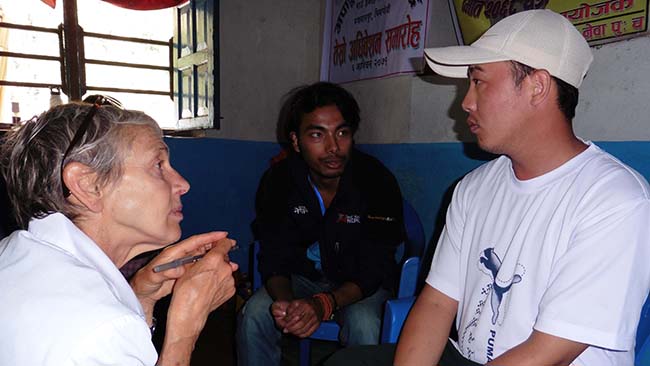
My experience with the Acupuncture Relief Project began after reading an article in an Acupuncture newsletter. The information on the website described it as a cultural immersion and it truly lived up to that description. As a participant we lived with a local resident and learned what is like to be part of the local culture and live the lifestyle of the residents in Bhemphedi, Nepal.
I found the people of Nepl to be a very gracious culture. At one point I had commented to an interpreter that I was so impressed with how kindly we were being treated and he responded that we are guests of Nepal and that is how guests should be treated. There was never a time we felt unwelcome - whether we were working, trekking, or walking through the village, everyone was kind and respectful. I found particular delight in the young children I encountered on my daily walks or coming home from the clinic. The would shyly say Nameste, then say hello. They would giggle with delight when I said Hello back to them. They were so excited to know their English had been understood and would say hello and goodbye repeatedly just to have me answer them.
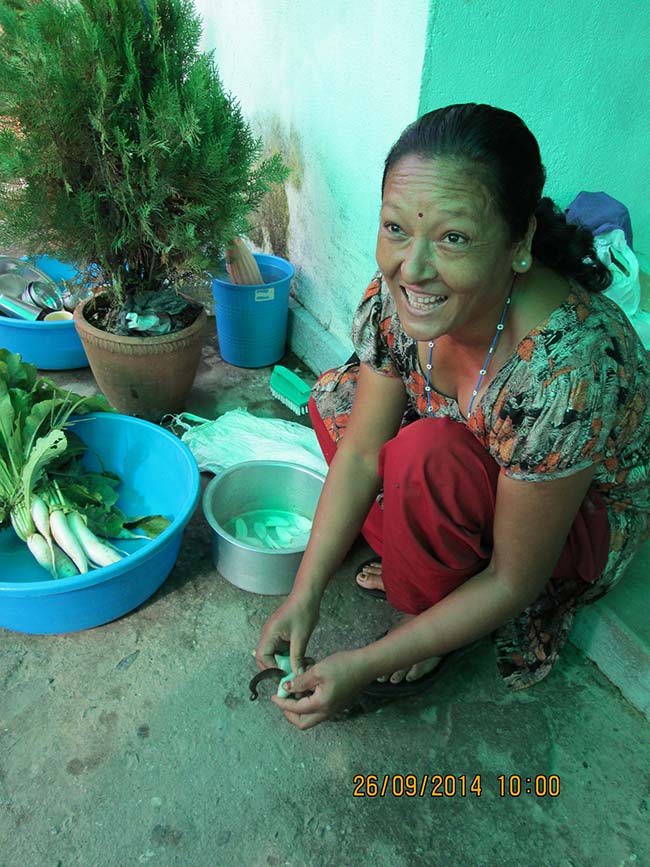
Our team stayed with a delightful lady we called Auntie. We stayed at her house which consisted of four bedrooms. The remainder of the house consisted of an outdoor kitchen, outside bathrooom and outside shower. Aunti was a gracious host who worked hard serving three substantial meals a day for six to twelve people. All cooking was done on two propane burners as there are no ovens or electric/gas ranges. There are no luxuries in Nepal - appliances that we consider normal and essential such as microwaves, washing machines, clothes dryers, and dishwashers are not available in the rural villages. Electricity would go out with no warning and there was never rhyme or reason when it would go out or how long it would stay out. The Nepalis, used to it happening, would go about their business as they were accustomed to such interruptions.
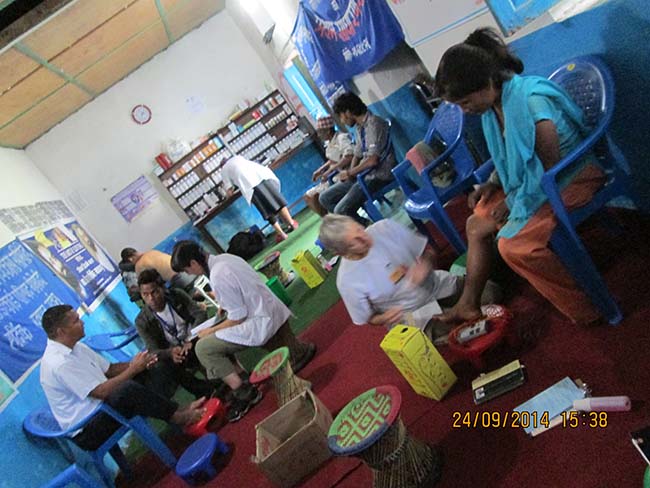
The work at the clinic was busy and intense. We saw many different conditions usually related to lifestyle. Farming is mostly done by manual labor, women and children carry extremely heavy loads on their backs and necks. The country is steep and everyone walks on narrow and rocky paths often carrying large loads of vegetables, firewood and staples such as rice and lentils. The lifestyle contributes to back, neck and knee problems which were common ailments treated at the clinic. Numerous other condtions such as stomach pain, menstrual disorders, stress and skin conditions were seen and it was gratifying to see so many respond to acupuncture treatment. Seeing the reults of the treatments has inspired me to return home and work with patients in my private practice.
When it rained the electricity would go out and the rain would come through the roof at the clinic. Patients would get wet yet they never complained. They were all appreciative that we came to volunteer and they would sit in the cold, rain, or whatever to take advantage of health care services. Heath care in Nepal is limited to non-existant. There is no such thing as health insurance and any services are always out of pocket expense. Employment opportunities are very limited and most people cannot afford to pay for care. The ARP project is staffed by volunteers and patients pay nothing for the services. Patients repeatedly thanked the team for what we provided and would bring in vegetables , freshly made mustard oil or other gifts out of appreciation. They would walk or ride the bus one, two or three hours to come to the clinic and it was not uncommon for them to have to wait an hour or two before being seen. They were always gracious and never complained about the wait -they were just grateful for a chance to get some help.
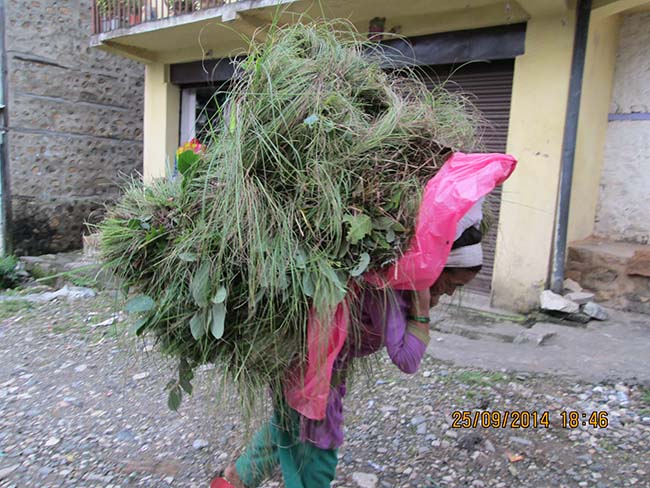
As part of the experience I learned a lot about life in Nepal and In general it is a very hard life. Women and children carry heavy loads on their backs to provide feed for animals or wood for a fire. Central heat or air is not an option. We trekked in the area where it is very cold and the only way to get supplies there is by humans, horses or yaks. Food is limited in supply and in variety. We stayed in small tea houses along the way and the owners were always gracious hosts and willing to share a warm fire in the very cold evenings. The rooms were unheated, the bathroom were outside and unheated and I thought about how much colder it would get in the coming months. I knew I would be home with my central heat and they would still be there with nothing but a clay cooking stove to provide heat and cook their meals. Yet the guest houses were always warm and welcoming in attitude and in service.
Educational opportunites are also limited in Nepal and I met many young people who valued the opportunity to attend school. Any chance for an education is appreciated. School is held six days a week and students often walk great distances to attend. There are no school buses - any season, any weather, and they walk to class as they know the more they learn the better the possibility of having a better life than their parents.
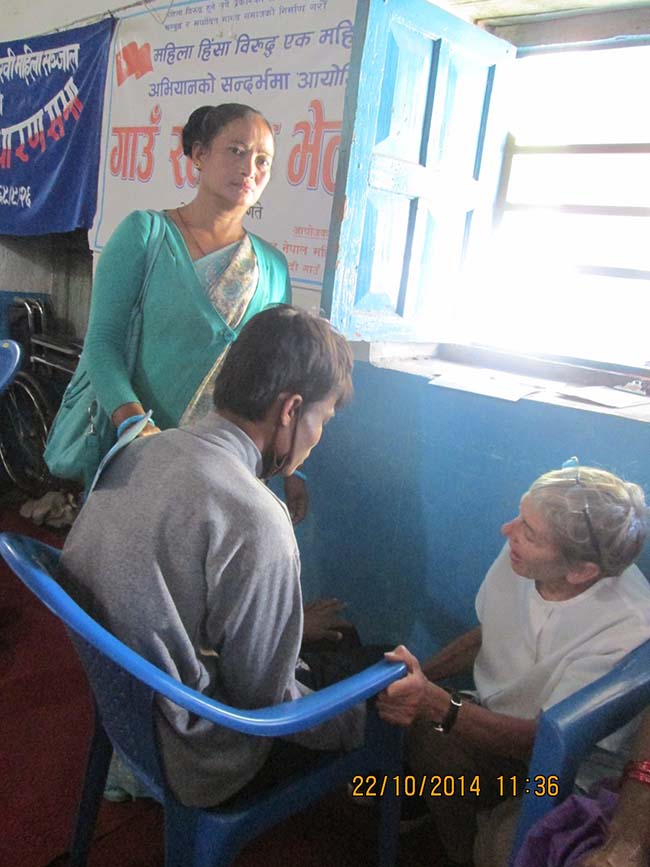
The interpreters at the clinic were young {18-25} and absorbed all they could from the doctors. The clinic where I volunteered was located in Bhemphedi although two nights I stayed in the village of Kogate as ARP has a satellite clinic there. One of the family members was a beautiful and enthusiastic young lady, Riesta, who wanted to read to me. I had a book on my computer tablet and she jumped at the chance to practice her reading and verbal English skills. At one point there was a statement in the book about life is not Disneyland. What is Disney land she asked? The conversation that followed found me searching for words to describe cartoons, amusement parks, Disney movies and many other subjects. It is challenging to explain those things to someone who has no concept of those experiences are like. She wanted to know all about America - politics, college, entertainment. the list was endless and she was a captiated listener as I attempted to explain and answer questions. She told me she was headed to college soon - she would take her backpack, take the bus, and go to a different town where her sister lived. College with only a backpack? I was amazed - not quite the experience for students in the States.
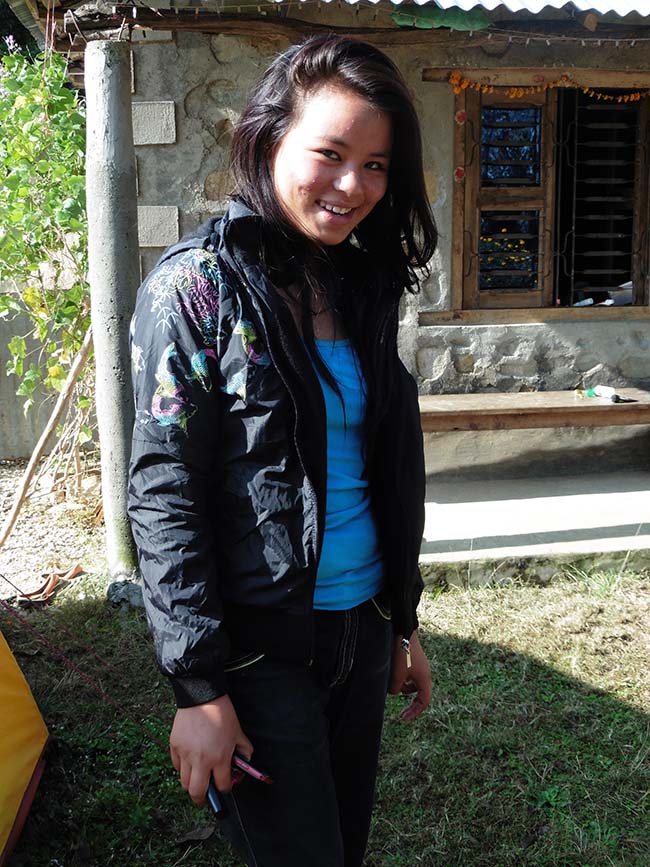
The second night Riesta came to read to me, she brought a small container of chocolate, dried coconut pieces and other treats. They were in a small container with a ribbon and she carefully unwrapped the ribbon and wanted to share. I looked at the container which held small candies and I knew they must have been a special gift for her. They were unlike anything I had seen in our local village - definitely something out of the ordinary. For Americans sweets like that are common, but for her it was something unusual and special. I initially declined saying I didn't want to ruin my dinner and she seemed so disappointed and hurt. I agreed to take her offer and she seemed so happy that I did. Her kindness and generosity was so very touching as here was someone willing to give when she obviouly had so little. This experience exemplified the Nepali culture in general. They are generous, gracious and caring and would share whatever they had even if it means they go without.
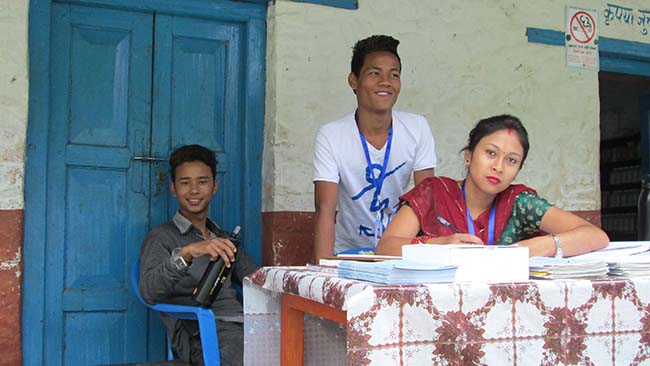
I listened to young people talk about their dreams and aspirations of traveling or having careers as fashion designers or journalists. It is an eye opening experience to relieze how much is available to the average American. If we want to travel, go to college or pursue a specific career it is always an open door. We do not have the limitations and obstacles that exist in Nepal. It was hard watching their glowing eyes as they spoke - yet wondering if any of them will ever achieve their goals. It was inspiring listening to their hopes and dreams but at the same time it was emotionally wretching knowing the reality of the situation. Many expressed to me their desire to visit the Staes as they view it as a place of great opportunity. Their views made me appreciate so much what we have and expect and how much we take for granted. Employment in Nepal is extremely narrow and many leave the country to pursue employment wherever they can, often in low paying jobs but they feel so fortunate to be working they take any job available.
Everywhere I went in Nepal I was asked how I liked their country, how was my stay, what do I think? Everyone takes great pride in their country and so much wanted the "guests" to enjoy their stay. They wanted our group to feel at home and welcome and appreciate what the country has to offer. In the end, my life in in Nepal has been challenging, educational and enlightening, and will always stand out as a memorable rewarding experience. ---Marian Klaes











